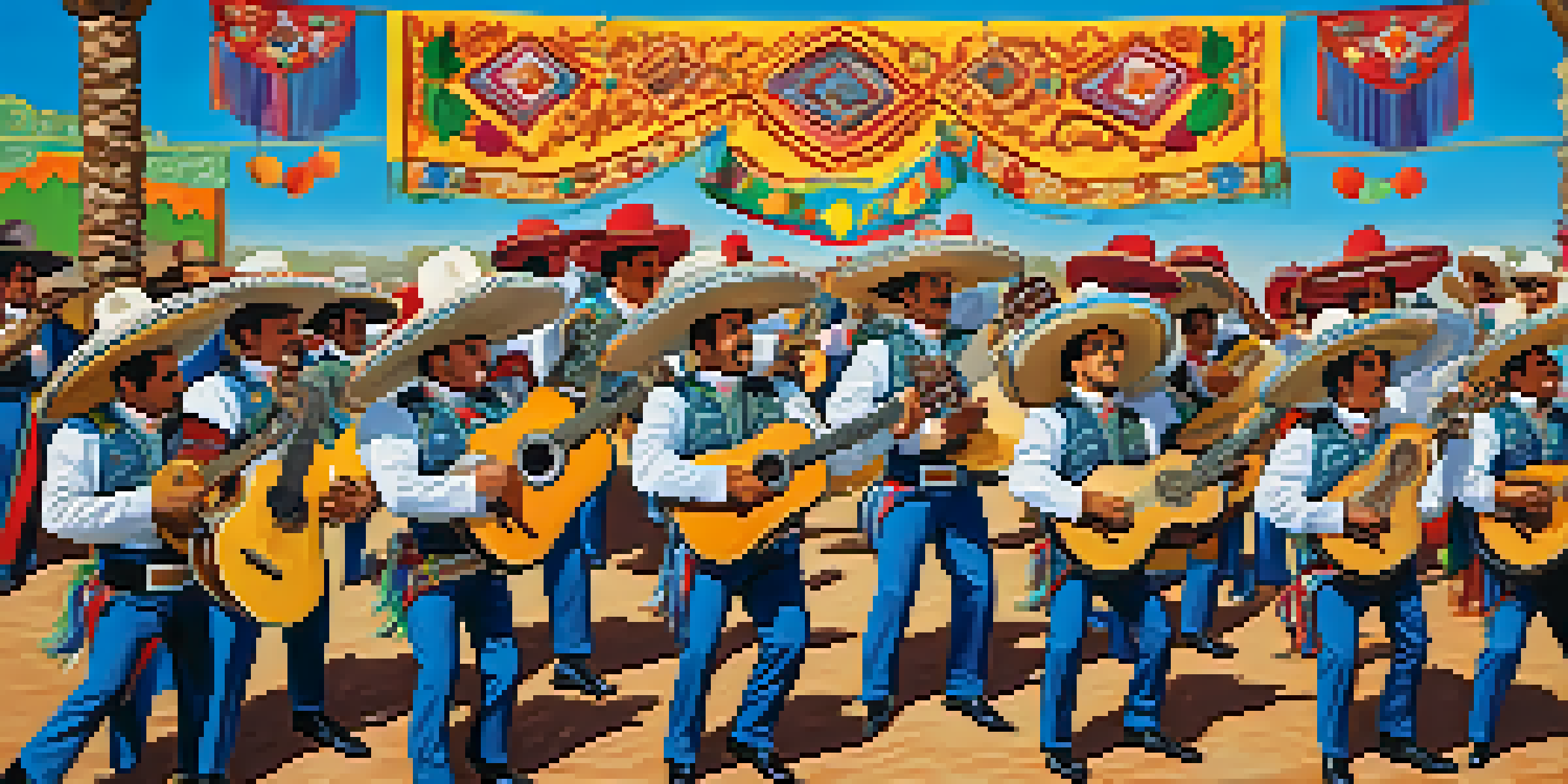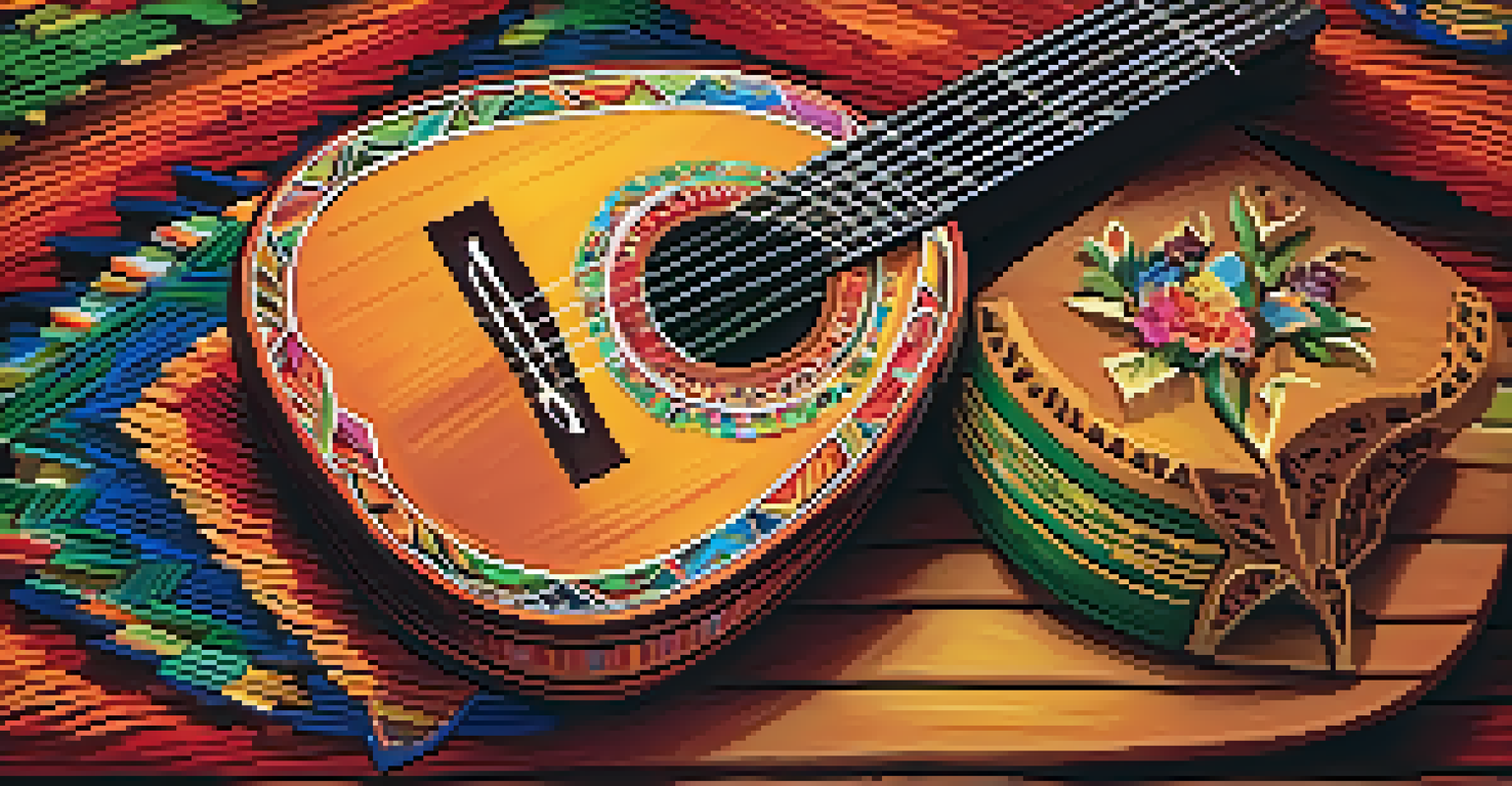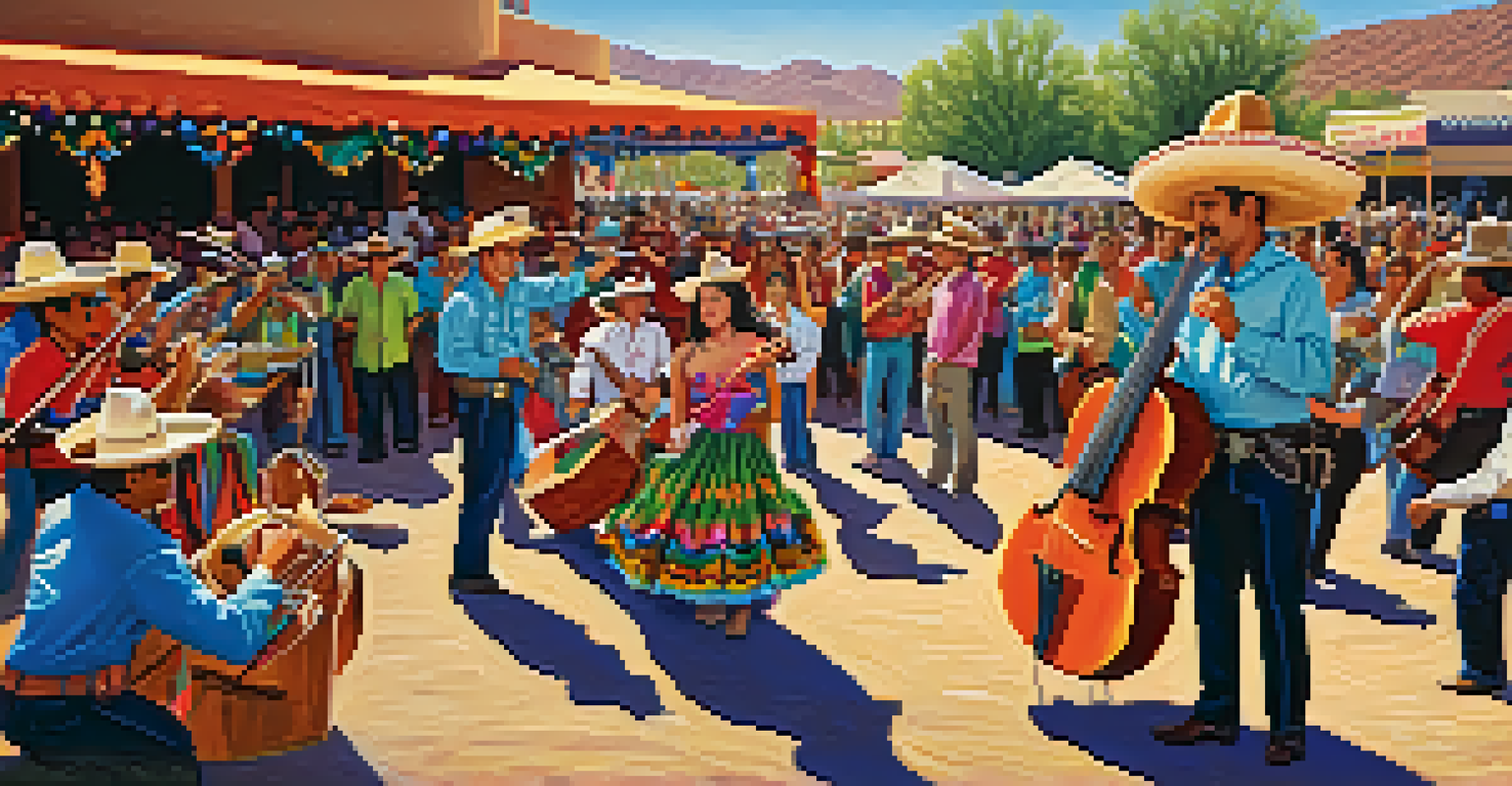Traditional Mexican Music and Its Role in Tucson's Culture

Understanding Traditional Mexican Music and Its Roots
Traditional Mexican music is a rich tapestry woven from various influences, including indigenous sounds, Spanish colonial melodies, and African rhythms. Each region in Mexico boasts its unique styles, such as Mariachi, Norteño, and Son Jarocho, reflecting the diverse cultural landscape of the country. These musical forms often tell stories of love, struggle, and celebration, making them an integral part of Mexican heritage.
Music is the universal language of mankind.
In Tucson, this music doesn’t just exist; it thrives, deeply embedded in the community's identity. With its proximity to the Mexican border, Tucson serves as a cultural crossroads where traditional music remains alive and evolving. Local musicians often blend traditional styles with contemporary genres, creating a unique sound that resonates with both locals and visitors alike.
Moreover, the role of music in Mexican culture extends beyond mere entertainment; it acts as a vehicle for cultural expression and preservation. Festivals, family gatherings, and community events often feature live music, emphasizing its importance in fostering relationships and keeping traditions alive.
The Role of Mariachi in Tucson's Cultural Landscape
Mariachi music, characterized by its vibrant sound and emotive lyrics, is perhaps the most recognized form of traditional Mexican music. In Tucson, mariachi ensembles are a common sight at celebrations, weddings, and public events, bringing joy and a sense of community. The musicians, often dressed in traditional charro outfits, not only perform but also engage the audience, creating an interactive experience.

Local schools and organizations have embraced mariachi, offering programs for young musicians to learn and perform. These initiatives not only honor the tradition but also cultivate a new generation of musicians who will carry the torch forward. Events like the Tucson International Mariachi Conference celebrate this art form, showcasing talent from across the nation.
Cultural Heritage Through Music
Traditional Mexican music serves as a vital expression of cultural identity, blending indigenous, Spanish, and African influences.
The presence of mariachi in Tucson is more than just a musical performance; it's a celebration of heritage. It fosters a sense of pride within the community, as families gather to appreciate the music that reflects their roots and shared history.
Norteño: A Sound of the Borderlands
Norteño music, with its accordion and bajo sexto guitar, resonates with the border culture of Tucson. Originating from Northern Mexico, this genre captures the essence of life along the U.S.-Mexico border, often reflecting themes of migration and identity. Its upbeat tempo and catchy melodies make it a favorite at local dances and gatherings, drawing people together to celebrate their shared experiences.
Without music, life would be a mistake.
In Tucson, Norteño music has found a special place in the hearts of residents, often played at community festivals and local venues. The lively beats encourage dancing and socializing, creating an atmosphere of camaraderie and joy. Many local bands specialize in this genre, infusing it with their unique flair while remaining true to the traditional roots.
The evolution of Norteño in Tucson showcases how traditional music can adapt and thrive in a new environment. As musicians blend modern influences with classic sounds, they keep the genre fresh and relevant, ensuring that it continues to resonate with younger audiences.
Son Jarocho: A Celebration of Veracruz Culture
Son Jarocho, originating from the Veracruz region of Mexico, is another vibrant genre that has found its way into Tucson's cultural fabric. This style is known for its distinct sounds produced by instruments such as the jarana and the requinto, and its lively, participatory nature encourages audience involvement. Much like a folk tradition, Son Jarocho blends music with dance and storytelling, making it a multifaceted art form.
Tucson hosts various cultural events that spotlight Son Jarocho, where locals gather to learn its rhythms and steps. These gatherings foster a sense of community and connection, bridging generations and cultures through shared musical experiences. The lively atmosphere and engaging performances draw in participants of all ages, encouraging everyone to join in the fun.
Mariachi's Role in Community
In Tucson, mariachi music fosters community spirit and pride, often performed at celebrations and family gatherings.
With its roots in community celebration, Son Jarocho exemplifies how traditional music can serve as a tool for cultural preservation. As musicians pass down their knowledge to younger generations, they ensure that this unique art form continues to thrive in Tucson.
The Impact of Music Festivals in Tucson
Music festivals in Tucson play a pivotal role in promoting traditional Mexican music and its cultural significance. Events like the Tucson Meet Yourself and the All Souls Procession not only showcase local talent but also celebrate the rich tapestry of Mexican heritage. These festivals provide a platform for artists to perform and connect with audiences, fostering a sense of community pride.
During these festivals, attendees can experience a variety of musical styles, from mariachi to Norteño and Son Jarocho, often accompanied by traditional dance performances and artisan markets. This immersive experience allows visitors to engage with the culture on a deeper level, creating a memorable connection to Tucson's diverse heritage. Such events also encourage cultural exchange, drawing in people from different backgrounds to appreciate and celebrate Mexican traditions.
Furthermore, the economic impact of these festivals cannot be overlooked. They attract tourism, support local businesses, and provide opportunities for artists to showcase their talents, ensuring the continuance of traditional music in the city.
The Role of Education in Preserving Traditional Music
Education is crucial for the preservation of traditional Mexican music in Tucson. Local schools and community programs often incorporate music classes that focus on traditional styles, teaching students not only how to play instruments but also the cultural significance behind the music. This educational approach helps cultivate a deeper appreciation for the art form and its history.
Workshops and classes led by experienced musicians provide hands-on learning experiences. Students have the opportunity to engage with the music, learn its rhythms, and understand the stories it tells. By fostering an environment of creativity and exploration, these programs encourage young musicians to express themselves through traditional music.
Education Preserves Musical Traditions
Local educational programs play a crucial role in preserving traditional Mexican music by teaching youth its cultural significance and performance techniques.
Moreover, collaborations between schools and local musicians create a vibrant learning community. These partnerships can lead to performances, festivals, and other events that further promote the importance of traditional music in Tucson's cultural landscape.
The Future of Traditional Mexican Music in Tucson
As Tucson continues to evolve, so does its musical landscape. The future of traditional Mexican music in the city looks promising, with younger generations embracing these cultural roots while also infusing them with modern influences. This blending of styles creates a dynamic environment where traditional music can thrive alongside contemporary genres.
Local artists are increasingly experimenting with different sounds, pushing the boundaries of traditional music while maintaining its essence. This innovation not only attracts a wider audience but also ensures that traditional forms remain relevant in today's music scene. Festivals and community events continue to play a vital role in showcasing this evolution, celebrating both the old and the new.

Ultimately, the enduring presence of traditional Mexican music in Tucson is a testament to the community's commitment to cultural preservation. As long as there are musicians passionate about their heritage, the vibrant sounds of mariachi, Norteño, and Son Jarocho will continue to fill the streets, reminding us of the rich cultural tapestry that defines Tucson.